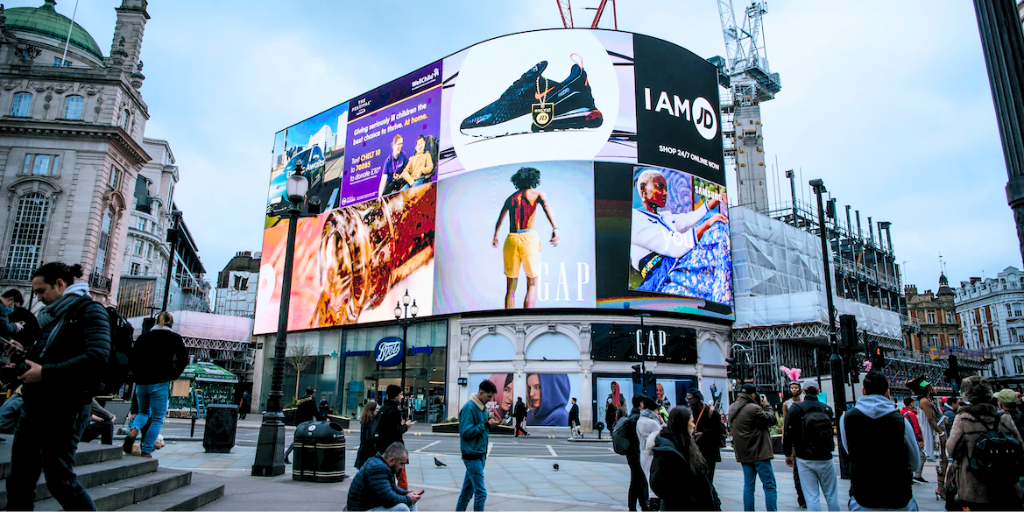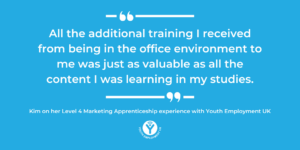Marketing Executive careers guide and job profile
Interested in capturing the attention of the public with your ideas? A career as a Marketing Executive could be for you!
Getting into Marketing Executive careers
How much money can you earn as a Marketing Executive?
These LMI Job Trends give you a sneak peek of how much you could earn starting out for this career, and how much your salary could grow with experience.
Average salary for marketing jobs
Recent labour market information says you can earn on average between £16,000 and £50,000 a year as a Marketing Executive in the UK.
Your starting salary can vary because of factors like level of experience, training, location or the size of the company. Your salary as a Marketing Executive will increase over time as you build skills, knowledge, and experience.
Sales, Marketing & Procurement Career FAQs & Insights

Is there something you’d like to know about Sales, Marketing & Procurement careers?
Skills you need to become a Marketing Executive
Useful skills to put in your CV:
- Great written and verbal communication skills – you’ll need to get your point across and influence the way people think through your words and visual designs.
- A creative approach to help you think of new and effective marketing campaigns
- Teamwork skills – you’ll likely be working with a marketing team who’ll all have a part to play in your campaigns
Top Skills-boosting Tip
Keep up with marketing trends!
New features, apps and trends are appearing all the time and you don’t want to be late to the party.
Look at how big TikTok is and how jumping onto a viral trend can boost your brand awareness and visibility!
You could keep up to date by joining webinars about social media trends.
- Self-management skills – you could be scheduling tweets or writing content and creating media promotions for clients on a daily basis
- Digital skills – to be able to use a computer and the main software packages confidently
- Problem solving skills and an curious mind – what can you do to make campaigns successful and get your message across through all the noise?
How Do You Get These Skills?
Vocational qualifications and work experience will help you build these skills over time.

Build Your Skills With the FREE Young Professional Programme
What Qualifications & Training Do You Need For Marketing Careers?
School, College and Training
You could take a course to help you get into trainee marketing executive roles. These include:
- Level 2 Certificate in the Principles of Marketing
- Level 3 Certificate in Digital Marketing and Analytics
You could do qualifications through professional bodies like the Institute of Data and Marketing and The Chartered Institute of Marketing to build your skills, knowledge and experience in marketing.
BTECs
As an alternative to A-Levels, you can do BTECs from the age of 16. There are a number of BTEC subjects you might want to consider if you are interested in becoming a Marketing Executive. Courses available could include:
- Marketing and Social Media Level 3 BTEC
- BTEC Level 3 National Extended Certificate in Marketing
- BTEC Level 5 Higher National Diploma in Business (Marketing)
Courses available can vary across schools, colleges and sixth forms and across training providers.
You’ll normally need 2 or more GCSEs at grades 9-3 (A*-D) or equivalent for a Level 2 or 3 course. If your qualifications are lower than this, you’ll most likely start on a Level 1 course.
University degrees and graduates
Marketing and digital marketing roles are open to graduates of all subjects. You could choose a specialist foundation degree, higher national diploma or degree in subjects like:
- marketing communications
- digital marketing
- advertising
- business and management
A degree with a work placement will help you gain valuable experience and may be an advantage when you look for work.
Other relevant courses that could give you important skills include: psychology, humanities, media, art, design, English literature or language, modern languages, or IT.
With a degree you could join a company marketing graduate scheme.
UCAS has more information on degree courses and entry requirements.
Apprenticeships
An apprenticeship is a scheme where you train while earning a starting salary. With an apprenticeship (or advanced apprenticeship) you’ll have a paid job with an employer that includes structured training and learning. This training leads to an official qualification that’s recognised by employers as an industry standard.
You could do:
- marketing assistant advanced apprenticeship
- digital marketer advanced apprenticeship
- marketing executive higher apprenticeship
- digital marketer degree apprenticeship
Anyone over 16 can study for an apprenticeship. You will normally need at least 5 GCSEs at grades 4-9 (A*-C) to study for an apprenticeship, including English and Maths.
A-Levels
A Levels are academic qualifications that come after GCSEs. A Levels can be an ideal stepping stone to an advanced apprenticeship, a degree, a job, or going straight into a freelance career.
Any A Levels relating to Business, English, or Media and Journalism will be useful.
You’ll normally need GCSEs at grade 4 (C) or above in English and Maths. 2 to 3 relevant A levels, or equivalent, are usually required to complete a degree.
T-Levels
T-Levels are a choice for learners after GCSEs alongside apprenticeships and A-levels.
T Levels, an alternative to A-Levels, are qualifications in vocational, technical and hands-on subjects that you can choose to do after GCSEs instead of traditional academic qualifications.
They include a mixture of classroom-based learning and industry placements where you can put your new skills into practice in real-world scenarios.
A T Level in Digital Production, Design and Development could be a good choice for an aspiring Marketing Executive.
You may need 4 or 5 GCSEs at grades 9 to 4 (A* to C), or equivalent, including English and maths for T Levels.
Career Progression
Where your career could take you…
What Work Experience Do You Need For Marketing Jobs?
Work Experience Tips
It can help you decide if this is the right career for you if you have previously done work experience in marketing, especially working with social media. Work experience in a marketing environment can help you build useful skills.
Examples of relevant work experience include:
- Work shadowing (even if it’s just for a day)
- Work placements in a company
- Work experience placements on a college or university course
You could start work with a social media or marketing company as an assistant or digital content writer. As you get more experience, you could work your way up into a management position.
Volunteering Tips
You could get experience by volunteering to manage a charity’s social media channels. To get a role as a Marketing Executive, you’ll most likely need to show you know how to use social media. You can do this by:
- managing your own social media profiles
- setting up and writing your own blog, and tracking its use and popularity
- getting involved in social media for the company you already work for
What Does A Marketing Executive Do?
Some example daily responsibilities include:
- Tracking the effectiveness of campaigns and reporting on those results to the marketing manager or the client
- Researching potential profit drivers in the form of target markets and possible sponsors
- Helping to create and plan out marketing campaigns
- Using software systems to track customer engagement and email campaigns
- Writing copy for promotion, whether it’s for online features, print brochures, snappy tweets or anything else where words can help your client or business sell
- Providing content for social media and online presences like websites
- Researching customer and market trends
How To Find Marketing Executive Jobs: Next Steps
To find jobs for young people in this role, search on jobs boards for early career roles and opportunities with keywords such as:
- Marketing apprentice
- Digital marketing apprentice
- Social media apprentice
- Junior marketing executive
- Graduate marketing executive
- Graduate marketing trainee
You can take a look at our database of local opportunities to see if there are any relevant jobs, work placements, or careers events and workshops to help you get started. Create Your Future!
All these types of job can be a good match for your skills.
When applying for these jobs, it may be useful to have examples of your successful work.
You may even be required to create a marketing campaign strategy as part of your interview.
Researching how to do this, or learning by gaining experience in your current role will help you.
Get Into Marketing Careers With Youth-Friendly Employers
These employers and organisations are here to help. They care about your potential and desire to learn, not just your qualifications and experience. They may be able to offer traineeships, apprenticeships, graduate schemes, first jobs, careers advice, wellbeing support and much more.
Sales, Marketing & Buying Career Tips & Opportunities
Sales, Procurement & Marketing Career Guides
View job descriptions with average UK salary, useful qualifications and a variety of routes into this career.
See All Our Youth-Friendly Employers


























































YES! I Want More Free Careers Help...
So what are you waiting for? Grab your future.



































